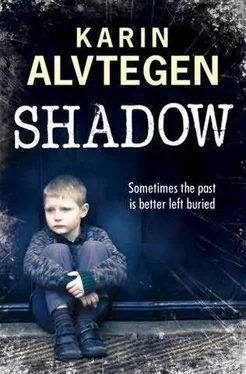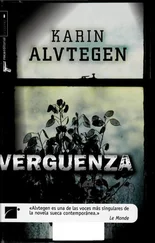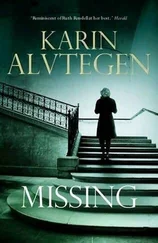Axel put a hand on Alice’s arm.
‘Now, now, calm down.’
‘There’s no need to call the police. She’ll probably be at home by the time I get back, and if not I promise to find her. You don’t have to be the least bit afraid. There’s a greater risk that she might injure herself.’
Alice sat back down.
‘But why Axel, in particular?’
Torgny shrugged.
‘Perhaps because we met him in Västerås, I don’t know.’
Alice turned to Axel.
‘So you have met her?’
‘Yes, we talked a bit during dinner, that’s all.’
Axel looked at Gerda. He realised at once he’d made a mistake. For the first time during the conversation she looked up and stared straight at him. He lowered his eyes, but the damage was done. From her expression he was clearly able to read what she was thinking, and it had nothing to do with what he’d said. He had given himself away with his anxious glance.
‘As I said, I simply want to apologise. I should probably go straight home and see whether she’s turned up.’
Gerda jumped up from the sofa and preceded Torgny out to the hall. Axel stood up to follow them, but Alice stopped him.
‘If I see any sign of that woman I’m going to call the police. What does she look like?’
‘Quite ordinary-looking, dark brown hair, average height. It’ll all work out, Alice, she obviously just needs to take her medication. When she takes it she’s apparently as normal as anyone else.’
Alice snorted.
‘As anyone else? As if that’s supposed to be reassuring.’
Axel said goodbye to Torgny and for safety’s sake locked the door. The blizzard seemed to have abated, but the wind was still blowing hard. Through the hall window he saw Torgny struggling through the snow. Alice disappeared upstairs, and he wondered whether he should follow her, but he decided not to. He could hear sounds from the kitchen, and after a brief pause he went in and sat down at the kitchen table. Gerda stood with her back to him, busy with something on the worktop. Her hands moved efficiently after many years of practice.
‘I have a feeling you don’t really believe what I said.’
Gerda spun round as if she hadn’t heard him come in.
‘Gosh, you gave me a fright.’
Axel sighed and gave her a little smile.
‘Can’t we start talking to each other as friends, once and for all, after all these years?’
Gerda didn’t reply; uncharacteristically she turned her back and went on with her chores. She pulled out a drawer and grabbed a whisk. She cracked two eggs on the edge of a bowl and began expertly whisking them.
‘We’re equals, you and I, Gerda. I don’t see why we can’t just treat each other that way. I’m good at writing and you’re good at what you do, so why do we have to make it so difficult?’
Gerda didn’t answer, but he could hear the motion of the whisk slow down slightly. Once again he felt the similarity to the conversations he’d had with his parents, as if his words were no longer comprehensible but took on a different meaning in their ears than they’d had in his mouth.
‘Gerda, please, won’t you at least talk to me?’
The whisk stopped abruptly. Axel looked at her back.
‘We’re not equals.’
She spoke so softly he had to strain to hear.
‘Yes, Gerda, we are.’
He saw her shoulders rise and fall with her breathing.
‘I know what I have to do, and I do it the best I can. That’s that.’
‘There, you see? That’s the way it is for me too. I just do what I do the best I can.’
In the silence that followed, everything lay open. For eighteen years they had shared this life. For the first time they were having a real conversation. He couldn’t quite grasp why it felt so important, but it did.
‘We’re not equals.’
‘What do you mean by that?’
She still had her back turned away from him.
‘Because I’m content and you’re not. You’re always chasing after what you imagine you could become.’
Gerda went back to whisking, marking the end of their talk. Axel sat speechless, contemplating her words. And he realised that he’d received the most serious insult of his life.
A week later and they all resumed their respective roles in the house. Everything returned to normal. Gerda took care of the housekeeping. Annika did her schoolwork. Axel struggled on with his novel, to no avail. What Alice was doing he had no idea, but she mostly stayed in the library, dressed in her customary dressing gown. They didn’t hear a peep from Torgny. He’d promised to ring as soon as he knew something, but apparently Halina was still missing. Then, on the seventh day, another letter appeared, and it turned out to be the beginning of a daily routine. Each morning a new envelope landed in the letter-box, and Gerda delivered them to his office without comment. Alice was not informed. On a few occasions she asked whether there had been any word from Torgny, and Axel was able to say truthfully that there had not. He put the letters unopened in his cupboard. If anything untoward were to happen, it was a good idea to save the letters as proof of her madness. And as with anything that goes on long enough, the whole thing soon became a habit; the letters were received with the same matter-of-factness as the morning paper.
February turned to March, and the world went its way.
Israel attacked Palestinian guerrillas in Lebanon, and in Mjölby 14 people died in a train crash. The king appealed to the media to respect his private life, and Iraqi forces put down the Kurds’ fight for freedom. U.S. Secretary of State Kissinger tried to mediate in the Middle East, but Egypt refused to go along with any demands as long as Israel occupied Arab land. Researchers feared that we were heading for a new ice age, Ingemar Stenmark won the World Cup, and it was claimed that the CIA had compiled a hit list of foreign heads of state, with Fidel Castro at the top.
Nothing much new under the sun.
It was April 1975.
T oday we are facing an acute threat to the environment, with the greenhouse effect and climate change. Today’s environmental destruction threatens our entire globalised world and in the long term could lead to the annihilation of our civilisation. By looking at prominent extinct civilisations, such as the Mayans, scholars have been able to show that what begins as environmental degradation risks ending in civil war and the total collapse of society.
It begins when population growth causes an increase in the demand for food and other resources. Forests are cleared, the soil erodes, plants and animals are wiped out to make room for agriculture and the breeding of livestock. The result of depleting the environment and using up resources is starvation, and finally the population begins to wage war over the shrinking supplies. In the end the total population drops drastically because of starvation, illness and war. The ability to adapt to new living conditions becomes the difference between life and death. Finally, the total collapse of society is unavoidable, and a civilisation goes under.
Today we are heading towards a repetition of this mistake. We decimate the forests, empty the seas of fish, deplete the soil and fight over the resources that are left. The difference is that we take it another few steps – we pollute the air and water, which causes global warming and destroys the basic prerequisites for our own life.
Earlier in history it was a matter of individual, isolated cultures that went under. Today’s environmental destruction threatens the whole of our globalised world. The only thing to our advantage, and which distinguishes us from earlier cultures that were wiped out, is that we have the opportunity to learn from others’ mistakes. But are we human beings capable of doing that in depth, or do we personally have to experience the consequences in order to avoid them? New generations seem to keep repeating the mistakes of history, despite research and extensive documentation of the results. What harms us is our tendency to choose most often to do what works best for ourselves in the short term, even though in the long run it turns out worse for all of us.
Читать дальше












